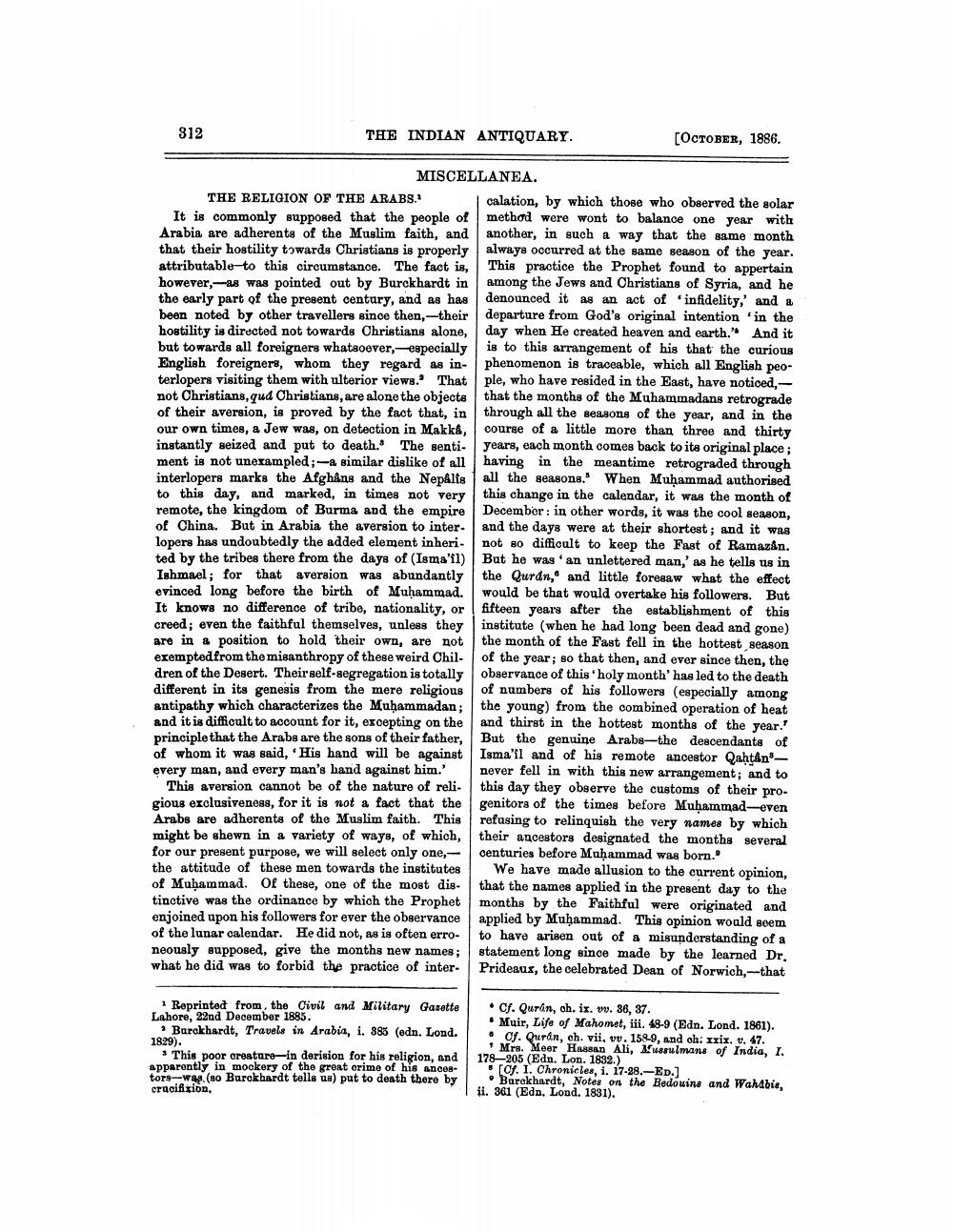________________
312
THE INDIAN ANTIQUARY.
[OCTOBER, 1886.
MISCELLANEA. THE RELIGION OF THE ARABS.
calation, by which those who observed the solar It is commonly supposed that the people of method were wont to balance one year with Arabia are adherents of the Muslim faith, and another, in such a way that the same month that their hostility towards Christians is properly always occurred at the same season of the year. attributable to this circumstance. The fact is, This practice the Prophet found to appertain however,--as was pointed out by Burckhardt in among the Jews and Christians of Syria, and he the early part of the present century, and as has denounced it as an act of "infidelity,' and a been noted by other travellers since then,--their departure from God's original intention in the hostility is directed not towards Christians alone, day when He created heaven and earth." And it but towards all foreigners whatsoever, especially is to this arrangement of his that the curious English foreigners, whom they regard as in- phenomenon is traceable, which all English peoterlopers visiting them with ulterior views. That ple, who have resided in the East, have noticed, - not Christians, qud Christians, are alone the objects that the months of the Muhammadans retrograde of their aversion, is proved by the fact that, in through all the seasons of the year, and in the our own times, a Jew was, on detection in Makka, course of a little more than three and thirty instantly seized and put to death. The senti. years, each month comes back to its original place; ment is not unexampled;- a similar dislike of all having in the meantime retrograded through interlopers marks the Afghåns and the Nepalis all the seasons. When Muḥammad authorised to this day, and marked, in times not very this change in the calendar, it was the month of remote, the kingdom of Burma and the empire December: in other words, it was the cool season, of China. But in Arabia the aversion to inter and the days were at their shortest; and it was lopers has undoubtedly the added element inheri- not so difficult to keep the Fast of Ramazan. ted by the tribes there from the days of (Isma'il) | But he was an unlettered man,' as he tells us in Ishmael; for that aversion was abundantly the Quran, and little foresaw what the effect evinced long before the birth of Muhammad. would be that would overtake his followers. But It knows no difference of tribe, nationality, or fifteen years after the establishment of this creed; even the faithful themselves, unless they institute (when he had long been dead and gone) are in a position to hold their own, are not the month of the Fast fell in the hottest season erempted from the misanthropy of these weird Chil of the year; so that then, and ever since then, the dren of the Desert. Their self-segregation is totally observance of this holy month' has led to the death different in its genesis from the mere religious of numbers of his followers (especially among antipathy which characterizes the Muhammadan; the young) from the combined operation of heat and it is difficult to account for it, excepting on the and thirst in the hottest months of the year.' principle that the Arabs are the sons of their father, But the genuine Arabs--the descendants of of whom it was said, His hand will be against Isma'il and of his remote ancestor Qahtanevery man, and every man's band against him.' never fell in with this new arrangement; and to
This aversion cannot be of the nature of reli- this day they observe the customs of their pro. gious exclusiveness, for it is not a fact that the genitors of the times before Muhammad-even Arabs are adherents of the Muslim faith. This refusing to relinquish the very names by which might be shewn in a variety of ways, of which, their ancestors designated the months several for our present purpose, we will select only one, centuries before Muhammad was born. the attitude of these men towards the institutes We have made allusion to the current opinion, of Muhammad. Of these, one of the most dis- that the names applied in the present day to the tinctive was the ordinance by which the Prophet months by the Faithful were originated and enjoined upon his followers for ever the observance applied by Muhammad. This opinion would seem of the lunar calendar. He did not, as is often erro. to have arisen out of a misunderstanding of a neously supposed, give the months new names; statement long since made by the learned Dr. what he did was to forbid the practice of inter- Prideaus, the celebrated Dean of Norwich,--that
* Reprinted from, the Civil and Military Gazette Lahore, 22nd December 1885.
Barokhardt, Travels in Arabis, i. 888 (odn. Lond. 1829).
* This poor creature-in derision for his religion, and apparently in mockery of the great crime of his ancestors-was (so Burckhardt tells ua) put to death there by crucifixion,
. Cf. Quran, sh. ix. w. 36, 37.
Muir, Life of Mahomet, iii. 48-9 (Edn. Lond. 1861). • af. Quran, ch. vii, vv. 159-9, and oh: xxix. t. 47.
+ Mrs. Meer Hassan Ali, umumans of India, I. 178205 (Edn. Lon. 1832.) C O. I. Chronicles, i. 17-28.-ED.)
Burckhardt, Notes on the Bedouins and Wahlbie, ii. 361 (Edn. Lond. 1831).




